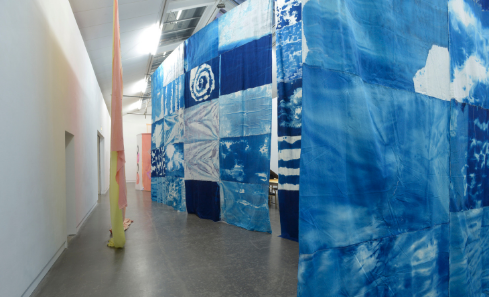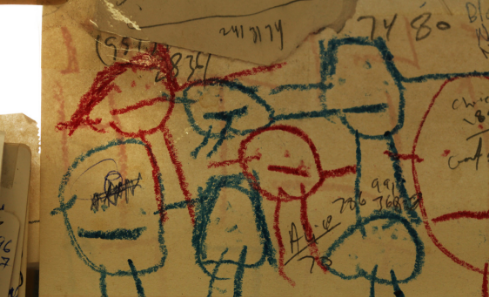CCA: 2019 Exhibition Programme from Creative Scotland on Vimeo.
After a period of closure, the CCA is back. And this time, the exhibitions programme is expanding beyond the walls of the gallery.
"With our Public Engagement Programme, we're asking lots of questions about how we speak about art, how we categorise art practice, and how we talk about the institution," says Curator Ainslie Roddick.
"So, I think it’s been a natural progression this year that the exhibition spaces would also start to question their role in lots of different ways."
The first exhibition to do so is Katherine MacBride: having been breathed out / patriarchy over and out. MacBride’s work explores different forms of hospitality, thinking about how listening and attentiveness can happen in conflicted spaces and times.
She is interested in how the structures of CCA can offer different modes for interpreting and accessing artworks, beyond pieces of paper or wall texts – how the work can involve itself in more material ways of speaking and performing.
I’m interested in how you don’t just bring an exhibition in and it disappears - what happens to all the people that were involved?- Ainslie Roddick, CCA
This new exhibition brings together a series of large-scale textiles – using a range of fabrics and forms which support different sensory capacities – installed as spaces for encounter, response, and rest: soft and tactile architectures, day beds, quiet acoustic interventions.
"It’s a nice way to start the programme," says Roddick, "because her practice ask lots of interesting questions about the institution and the gallery, and how our activities and our programme talks about the act of hosting and hospitality.

"That’s something we’re really interested in thinking more about at CCA, for lots of different reasons - one being that we’ve got the Open Source Programme, and it works in lots of really interesting ways.
"But we’re interested in how it allows us to think differently about the rest of the building, and what’s outside of the building, and how we use the resources of the institution."
These questions come at an interesting time for CCA, having been closed for several months following a fire at Glasgow School of Art.
"I mean, it was a stressful time," Roddick says. "But with these sorts of situations you have to think about what it has allowed. It did allow us to slow down and speak to each other more, and also just to say to artists to slow projects down."
"I think for me personally, and for me in my role, it did enable a lot of interesting things to happen, because we were able to question what we were doing and why."
Macbride's exhibition runs until Sunday 24 March 2019. On Saturday 20th April, Shadi Habib Allah's work will inhabit the space.
"He’s working with film, sound and sculpture," says Roddick. "His practice looks at the impact of government welfare policies, particularly in Miami and the US, and how welfare policies are interpreted and used on a subcultural level."
It addresses questions such as "What kind of economics and survival techniques do people use to navigate the way that the state changes its provision?", Roddick explains.

"But he’s also looking very much at the local area, and is interested in things like planning and city planning, and with economy or locale changes."
Once again, this exhibition holds some meaning for the CCA itself. "For us, it ties in really well with our own street, and what’s happening with Sauchiehall Street going through a lot of changes in the last six months," Roddick says.
Once that exhibition closes on (on Sunday 2 June), the structure of the exhibitions is changing slightly.
"We’re shifting from using all three spaces, and then closing, and then having a six week project, and then closing, to a bit more of a slower rhythm and more crossover between projects.
"Shadi’s show will take place in one of the spaces, and then three weeks later we’ve got a project with Emilia Beatriz.
"This project has been a really nice thing to work on over the closure. It became a really nice, slow conversation where we focused on production and how to talk about their practice differently."
This eight-week work explores the history of Puerto Rico and Scotland and addresses questions of land, land ownership and healing.
They’re "very interested in practices of herbal resistance and alternative forms of agriculture, and thinking about questions of sovereignty through the land, and access to the land, and how you’re able to have autonomy over what you grow," Roddick says. "Also what enters your body through anything toxic that might come through the land."
"We’ve been thinking of that particularly in Puerto Rico, what that means and how there are many practices there that explore these questions all the time. But also, what that might mean for a space like Scotland, where we have questions of our own about independence and sovereignty, but it doesn’t seem to talk so much about the body and about the specific question of land or growing or accessing something thats not a border."
Roddick says that Beatriz's exhibition has also facilitated an interesting discussion about what happens to a space when an exhibition occupies it.
"The architecture of the exhibition itself can enable a different discussion," she says. "I’m interested in how you don’t just bring an exhibition in and it disappears - what happens to all the people that were involved?
"Emilia is really interested in that as well. I think we’re doing that through architecture of the exhibition space and creating spaces of mediation."
"Katherine’s also doing this with this exhibition, with just very simple gestures - like tables, and with textures and materials.
"These are things that I’m really interested in - how these questions of materials and sculpture or film or museum architecture can work in more complex ways together. How material experience can be a social experience and a social experience can be a material experience."
Beatriz's work, Roddick says, has also helped to inspire a connected research project within CCA - a seed library.
"We as an institution are really interested in how we can talk more about libraries and to host collections of libraries in the space," she explains.
"But also, libraries don’t have to just be books and publishing. They can be other forms of sharing knowledge.

"When Emilia’s project opens, we’re also going to open a seed library, which again will allow us to start a conversation about the kind of activities that we’re hosting, what the institution classifies as art, and how we start to have a more profound an complex conversation with the public about what we do.
"A seed library is a small cabinet space where people can come and pick up seeds and leave their own seeds and write their own interception, and then go away and grow their plants, or grow the fruit and vegetables and bring back seeds the following year.
"But there’s something about doing that in an art institution that I’m really interested in.
"It asks questions I guess about what we’re here to host, and what is a cultural activity, and what are these sorts of forms of engagement or mediation of conversation that we can have at the same time as having an art object of a film screening.
"It’s a way for us to connect that to the public in a complex way, that's less didactic and less passive."
CCA is one of Creative Scotland's Regularly Funded Organisations 2018-21.
Katherine MacBride: having been breathed out / patriarchy over and out runs until Sunday 24 March 2019; Shadi Habib Allah's exhibition runs from Saturday 20 April – Sunday 2 June 2019; Emilia Beatriz's exhibition runs from 4 May - 26 June 2019.
Find more details, and further exhibition/event information at cca-glasgow.com.
(Images: Katherine MacBride; Shadi Habib Allah, CCA External Shot - Alan Dimmick, via CCA).